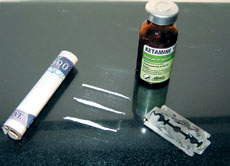JEDDAH, 7 October 2005 — Ketamine means different things to different people. To a veterinarian, it is an animal tranquilizer, but to “ravers” and club-goers, it is a “disco drug”. As popular as Ecstasy, “Special K” (its club name) is available here in Jeddah, over-the-counter and without a prescription.
In its liquid form, as it is sold, it is of little use to those wanting to get high, but once converted to a fine powder, it is snorted in much the same way as any other narcotic.
Manufactured by Alfasan Pharmaceuticals of Holland, Ketamine has been marketed in the United States as a rapidly acting general anesthetic used in both human and veterinary practice since 1971. Chemically, it is related to phencyclidine (PCP) which was developed in the 1950s as an intravenous anesthetic. Due to the side effects of confusion and delirium, its development for human medical use was discontinued. The effects produced with Ketamine use are similar, although less intense and shorter in duration than those of LSD or PCP.
Containing no cocaine, ecstasy, heroin, amphetamines or any other widely recognized controlled substance, it only became classified as a controlled substance by the US Drug Enforcement Administration for the first time in 1999.
According to www.projectghb.com, a website providing information for parents on the myriad of “rave”’ and “disco” drugs, Ketamine, “does not depress critical body vitals as much as other anesthetics, and is often used to treat burn victims. It produces a dissociative state in the central nervous system in which amnesia and profound analgesia (loss of pain) are induced. This ability to induce lack of awareness to the environment is the effect users crave.”
“Most of the time, I felt like a pure light that could flow like lava and make sweet guitar distortions sounds. I was burning very bright. I could just ‘be’ in this state; it felt beautiful,” one Special K user said. “Other times, I would have conscious thoughts. I would note that I felt all powerful. I loved myself and it felt great. When I would think of my friends, I would feel very warm but when I tried to explain to them how I felt, the words came out slurred, and I lost the feeling.”
In Saudi Arabia, Ketamine sales are not regulated as it has not yet been recognized as an illegal narcotic, and chances are that most police officers won’t even know what it is when faced with it. In it’s liquid form, it looks like any injectable medicine found at any pharmacy in the Kingdom, arousing little suspicion at checkpoints.
At veterinary pharmacies located right in front of the Ministry of Agriculture’s building at Kilo 10 on Makkah Road 100 milligrams of Ketamine were on sale for SR110. The same amount of Ketamine is sold for double that price on the black market in the United States. Converted into a powder form, it can be sold on the Saudi black market for hugely inflated prices in much the same manner as illegal drugs and alcohol.
A 24-year-old Saudi, who used Ketamine while studying in Britain, expressed surprise that Special K was available in Jeddah. “I would have never imagined it. I guess I just never thought about it. Considering that one hit of Ecstasy is sold on the black market here for SR1,000, I know some people in the Kingdom who would pay more than that for a vial,” he told Arab News.
For liquid Ketamine to be converted into Special K, it is simply poured out into a glass plate and left to air-dry for six hours until it crystallizes. It is then chopped up into a fine powder using a razor blade and then snorted.
“Amnesia may be present for one or two hours. A dose of just 0.07 grams of powder may produce common symptoms of intoxication and a mechanical buzzing in the user’s ears. Users of 0.2 grams may enter a mellow, colorful “K-land”, while 0.5 grams is more likely to take you to a “K-hole”, with out-of-body, near death encounters, hallucinations, delirium, etc. Effects usually last an hour or less, but judgment, coordination and senses may be affected for 18 to 24 hours,” www.projectghb.com states.


